2009年高考英语第二轮热点专题复习——动词的时态和语态
- 格式:doc
- 大小:196.00 KB
- 文档页数:28
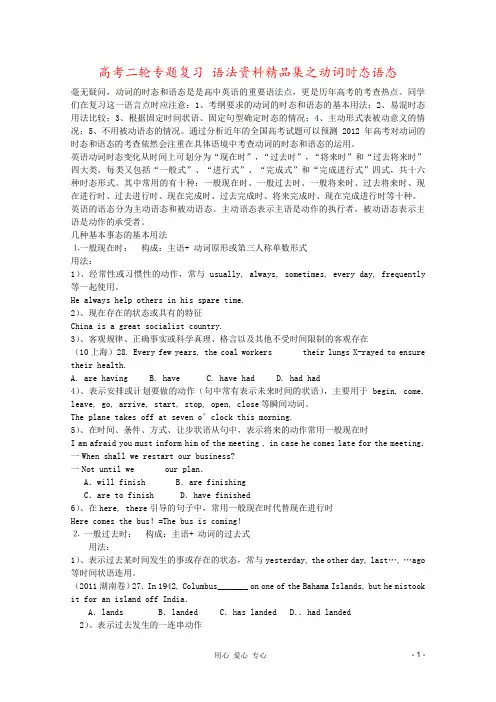
高考二轮专题复习语法资料精品集之动词时态语态毫无疑问,动词的时态和语态是是高中英语的重要语法点,更是历年高考的考查热点。
同学们在复习这一语言点时应注意:1、考纲要求的动词的时态和语态的基本用法;2、易混时态用法比较;3、根据固定时间状语、固定句型确定时态的情况;4、主动形式表被动意义的情况;5、不用被动语态的情况。
通过分析近年的全国高考试题可以预测2012年高考对动词的时态和语态的考查依然会注重在具体语境中考查动词的时态和语态的运用。
英语动词时态变化从时间上可划分为“现在时”,“过去时”,“将来时”和“过去将来时”四大类,每类又包括“一般式”、“进行式”、“完成式”和“完成进行式”四式,共十六种时态形式。
其中常用的有十种:一般现在时、一般过去时、一般将来时、过去将来时、现在进行时、过去进行时、现在完成时、过去完成时、将来完成时、现在完成进行时等十种。
英语的语态分为主动语态和被动语态。
主动语态表示主语是动作的执行者,被动语态表示主语是动作的承受者。
几种基本事态的基本用法⒈一般现在时:构成:主语+ 动词原形或第三人称单数形式用法:1)、经常性或习惯性的动作,常与usually, always, sometimes, every day, frequently 等一起使用。
He always help others in his spare time.2)、现在存在的状态或具有的特征China is a great socialist country.3)、客观规律、正确事实或科学真理、格言以及其他不受时间限制的客观存在(10上海)28. Every few years, the coal workers their lungs X-rayed to ensure their health.A. are havingB. haveC. have hadD. had had4)、表示安排或计划要做的动作(句中常有表示未来时间的状语),主要用于begin, come, leave, go, arrive, start, stop, open, close等瞬间动词。

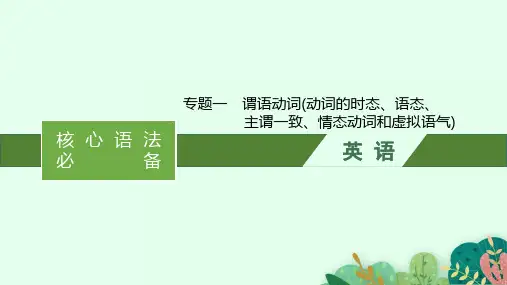
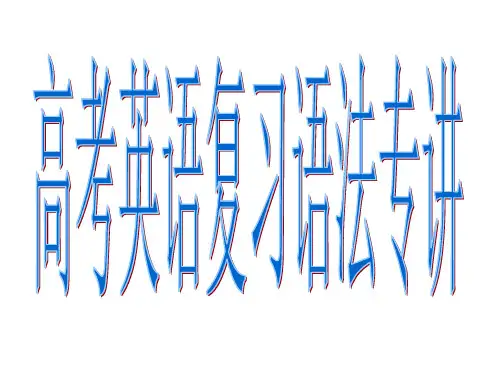

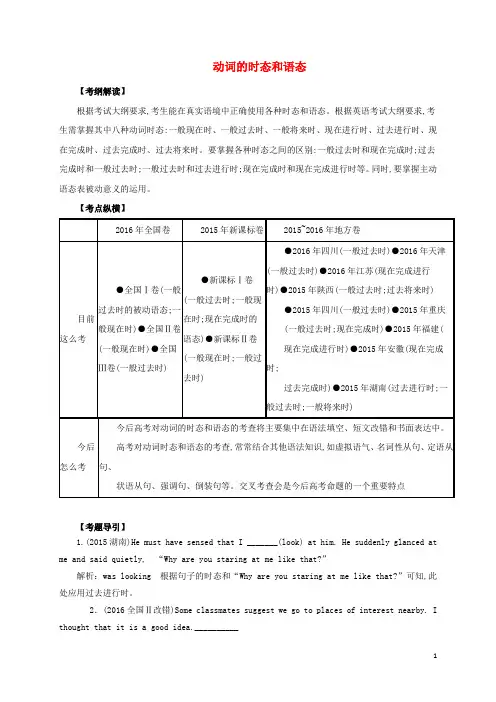
动词的时态和语态【考纲解读】根据考试大纲要求,考生能在真实语境中正确使用各种时态和语态。
根据英语考试大纲要求,考生需掌握其中八种动词时态:一般现在时、一般过去时、一般将来时、现在进行时、过去进行时、现在完成时、过去完成时、过去将来时。
要掌握各种时态之间的区别:一般过去时和现在完成时;过去完成时和一般过去时;一般过去时和过去进行时;现在完成时和现在完成进行时等。
同时,要掌握主动语态表被动意义的运用。
【考点纵横】【考题导引】1.(2015湖南)He must have sensed that I _______(look) at him. He suddenly glanced at me and said quietly, “Why are you staring at me like that?”解析:was looking 根据句子的时态和“Why are you staring at me like that?”可知,此处应用过去进行时。
2.(2016全国Ⅱ改错)Some classmates suggest we go to places of interest nearby. I thought that it is a good idea.__________解析:thought改为think 陈述现在的情况,用一般现在时。
3.(2016天津)When walking down the street, I came across David, whom I ____________(see) for years.解析:hadn’t seen句意:当沿着街道散步的时候,我遇见了多年未见的David。
根据语境可知,定语从句中的动作发生在come across之前,是过去的过去发生的动作,故用过去完成时。
4.(2015浙江)Albert Einstein was born in 1879.As a child, few people guessed that he ___________(go) to be a famous scientist whose theories would change the world.解析:was going 由语境可知,此处表示“从过去看将来”,用was / were going to do。
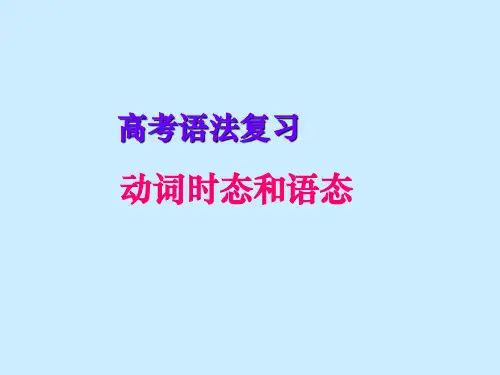

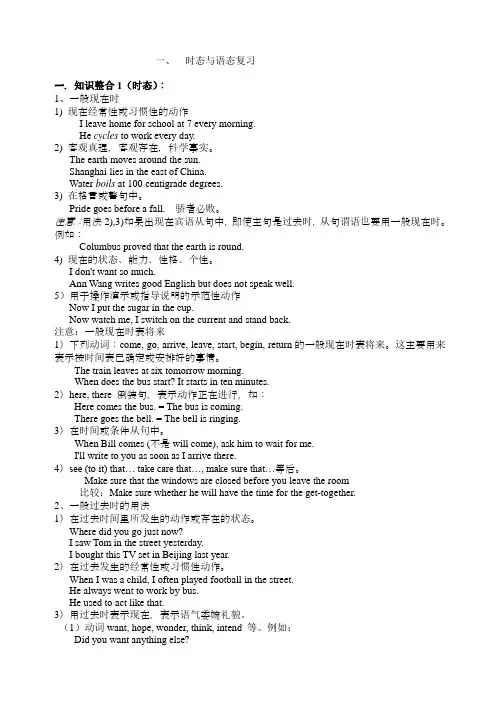
一、时态与语态复习一.知识整合1(时态):1、一般现在时1) 现在经常性或习惯性的动作I leave home for school at 7 every morning.He cycles to work every day.2) 客观真理,客观存在,科学事实。
The earth moves around the sun.Shanghai lies in the east of China.Water boils at 100 centigrade degrees.3) 在格言或警句中。
Pride goes before a fall.骄者必败。
注意:用法2),3)如果出现在宾语从句中,即使主句是过去时,从句谓语也要用一般现在时。
例如:Columbus proved that the earth is round.4) 现在的状态、能力、性格、个性。
I don't want so much.Ann Wang writes good English but does not speak well.5)用于操作演示或指导说明的示范性动作Now I put the sugar in the cup.Now watch me, I switch on the current and stand back.注意:一般现在时表将来1)下列动词:come, go, arrive, leave, start, begin, return的一般现在时表将来。
这主要用来表示按时间表已确定或安排好的事情。
The train leaves at six tomorrow morning.When does the bus start? It starts in ten minutes.2)here, there 倒装句,表示动作正在进行,如:Here comes the bus. = The bus is coming.There goes the bell. = The bell is ringing.3)在时间或条件从句中。
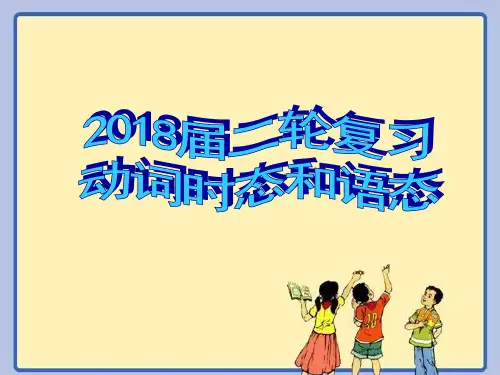
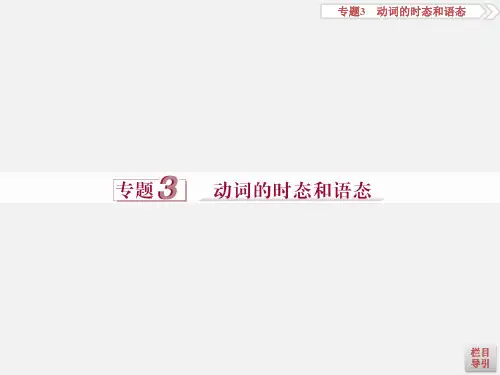
高考英语二轮专题总复习语法精选讲义第二部分动词时态和语态动词时态1.记住与各时态相关的“特征词”.2.表示“将来”的几种形式及基本区别:shall will be going to +动词原形be to do sth.be +coming (leaving, starting, reaching, returning…. be about to do sth.3.用于表示过去未实现的希望和计划的表达:A. should like to / would like to / would love to + 不定式的完成时态B. was / were going to do sth.(用过去将来时态表示原打算做什么.)C. was / were going to have done sth. 表示未完成原来的计划和安排.D. expect , intend , hope , mean , plan , promise , suppose , think , want , wish...常用过去完成时态. 在这些词后接宾语从句或者接不定式的一般形式;或者用一般过去时态后面接不定式的完成形式表示过去未曾实现的愿望.E. wish that …had done sth.表示过去未曾实现的愿望.F.情态动词should ,would, could, might, ought to等后接不定式的完成时,表示过去本该做,打算做,想做而未做的事情.G. had better / would rather + 不定式的完成时,表示一种过去的愿望.常译为“当初最好/当初真该....”4. 完成时态中瞬间动词的处理方法:A. 不和表示一段时间的时间状语连用.B. 将瞬间动词变成状态动词.C. 换用句型.It is….. since …did…5. 复合句中的时态问题:A.主句是现在时态,从句可是任意时态.B.主句是将来时态,条件状语从句中只能用现在时态.C.主句是过去时态,从句只能是过去的时态.6. 情景中的时态问题.这是近几年高考中时态考察的重点.关键是要对所提供的情景进行仔细认真的分析善于找到判断时态的依据.7.与时态有关的几个特殊句型1).It / This / That is + 最高级 + n. + 定语从句”2). “It / This / That is the first / second / third... time + that从句”3. )“It is / has been + 一段时间 + since从句”4. “主语+ was / were + doing... when...” /“主语+had done…. when …”5. “主语+ was / were about to do... when”或“主语 + was / were on the point of do ing... when”6. “Hardly / Scarcelyhad + 主语 + 过去分词... + when...” 或“No sooner had + 主语 + 过去分词... + than...”7. “It + be +一段时间+ before从句”It will be two years before he comes back from abroad.两年以后,他才会从国外回来。
高考英语二轮语法词汇复习系列第七章动词时态和语态英语的动词不同时间里发生的行为或存在的状态,要用不同的形式来表示,这种不同的形式叫做动词的时态。
英语常用的时态有八种,分别是:一般现在时、现在进行时、现在完成时、一般过去时、一般将来时、过去进行时、过去完成时和过去将来时。
英语动词有两种语态:主动语态和被动语态。
主动语态表示主语是动作的执行者,被动语态表示主语是动作的承受者。
例如:He wrote a novel.(主语he 是动作wrote 的执行者,是主动语态。
)The classroom was cleaned by him yesterday.(主语the classroom 是动作的承受者,是被动语态)高考重点要求:1、通过上下文或所设定的语境,正确判断和运用各种时态2、在书面表达中能根据动作发生的时间关系,正确使用动词时态3、根据主语与谓语的逻辑关系,正确判断和运用主动语态和被动语态第一节知识点概述一、动词时态英语的动词在表示不同时间里发生的行为或存在的状态时,要用不同的形式来表示。
英语的时态从时间上来看,可分为“现在”,“过去”,“将来“和”过去将来“四大类。
动词共有十六种不同时态,但常用的时态有八种。
(一)一般现在时一般现在时表示经常发生的动作(习惯性的动作)或存在的状态,句中常用always, usually, often, sometimes, seldom, never, every day等时间状语。
例如:1)He goes to school at seven o’clock every d ay.2)The sun rises in the east.(二)一般过去时一般过去时主要用于表示过去的动作、行为或状态,句中常有yesterday, ago, in 1989, once, last week (month, year), at that time, just now 等时间状语。
动词的时态和语态知识点一一般时态1.一般现在时(1)表示经常发生的、习惯性的、反复出现的动作或状态。
常与表示习惯的副词(词组)always,every time,now and then,occasionally,often,seldom,sometimes,usually,every day/night等连用。
(2)按时间表、时刻表、日程表等安排将要发生的动作,用一般现在时。
只限于go,arrive,leave,start,stay,return,begin,come等动词。
(3)用在时间、条件或让步状语从句中,用一般现在时表示将来。
Around two o’clock every night,Sue will start talking in her dream.It somewhat bothers us.每天晚上两点左右,苏就说梦话。
这使我们有点烦心。
If it doesn’t rain,we’ll go on a picnic as planned.如果不下雨,我们将按计划去野餐。
Whatever you say,I will not change my mind.无论你说什么,我都不会改变主意。
The flight takes off at 2:30 every Wednesday and Friday.飞机每周三、周五2:30起飞。
2.一般过去时表示在过去某一时间点发生的动作或所处的状态,与现在没有关系或表示过去一段时间内反复发生的动作。
—Haven’t seen you for ages! Where have you been?——好长时间没见你了!你去哪里了?—I went to Ningxia and stayed there for one year,teaching as a volunteer.——我去了宁夏,在那里待了一年,作为一名志愿者教学。
3.一般将来时(1)“shall/will+动词原形”表示现在看来以后要发生的动作或存在的状态。
2009年高考英语第二轮热点专题复习——动词的时态和语态内容解读1.高考考查的八种动词时态是:①一般现在时;②一般过去时;③一般将来时;④现在进行时;⑤过去进行时;⑥现在完成时;⑦过去完成时;⑧过去将来时。
2.容易混淆的三组动词时态是:①一般过去时和现在完成时;②一般过去时和过去完成时;③过去完成时与现在完成时。
3.各种时态及含情态动词的被动形式和应用。
能力解读1.了解动词时态的时、体概念;2.了解常考八种时态的基本用法并能够在真实的情景中恰当使用八种时态进行交际;3.能够区别容易混淆的时态的用法;4.掌握各种时态及含情态动词的被动语态的形式和应用;①分清动词的词性,熟悉并掌握常见的不及物动词happen, take place, occur, exist 等,它们不能用被动语态;②分清主语与谓语之间的关系;③变被动语态的动词一般为及物动词,但有些不及物动词与介词所形成的短语动词也可有被动形式,此时,变被动语态后介词不能丢;④熟悉并掌握主动形式表被动意义的情况。
规律方法1.试题的立意由简单直接的“结构立意”(如状语从句、宾语从句等)转向了“情景立意”。
试题创设的语境明确,交际情景(对话形式占有一定比例)多是发生在学生学习或日常生活中的真实情况。
这样的情景设置实质上是对语法知识、语义理解和语言交际能力的综合考查,体现了高考试题由“知识立意”向“能力立意”转变人命题原则。
2.题干中的有效信息由“外显的”转向“隐藏的”。
3.试题的设问多以中学生普遍感到难以把握的几组时态来相互干扰。
命题趋势毫无疑问,对于动词时态的考查仍交进高考的测试重点。
试题将继续呈现“情景立意”和“能力立意”的原则,即在考查固定句式中的时态和语态的同时,注重在上下文中考查时态和语态,注重在语境中考查时态和语态。
突破方法1.学习动词的时态和语态时,切不可脱离实际运用的语言,一味死记硬背语法规则的条条框框。
了解了八种时态的一些常见规则之后,要留心以英语为母语者在实际生活中是如何使用各种时态的语态的。
其实,教材中每单元第一课的情景对话,是领司时态用法真谛的最佳语言材料。
2.答题时,研读题干,搜索出尽可能多的“时间参照信息”,尤其是动词冗余信息中的时间信息。
如第10题目中的haven’t said, Do, I’m, sooner, think, it’s 等,这些表达中都含有时间信息,发现和有效利用这些信息是解决问题的关键。
3.解决时态和语态问题,要遵循如下解题思路:①这个动作可能发生在什么时间?题干句中可参照的时间信息有哪些?②这个动作处于什么状态,是进行中,还是已结束(完成)?限制或修饰这个动作的状语信息有哪些?(第4题中的rapidly 是个很关键的信息词)③这个动作与主语的关系,是主动还是被动?只要全面细致地考虑了这些问题的答案,试题的正确答案也就水落石出了。
知识清单清单一动词的时态一、时态的概念时态是一种动词形式,它是“时”和“体”的组合。
“时”有现在、过去、将来、过去将来之分;“体”有一般、进行、完成、完成进行之别。
动词的动作可发生于四种不同的时间,表现四种不同的“体”,每一种“时+体”就构成一种时态。
所以英语动词共有(4×4)十六种时态,高中英语教学大纳中要求掌握的只有八种:一般现在时,一般过去时,一般将来时,现在进行时,过去进行时,现在完成时,过去完成时,过去将来时。
另外现在完成进行时,过去完成进行时和将来完成时也比较常用。
二、一般体、进行体、完成体的含义一向指某动作既不正在进行又不确定完成与否的一种广泛意义上的方式。
进行指一种持续性的、未完成的动作。
动词的进行时还伴有其他一些意义,如:有限度的延续性、感情色彩、同时性、描述的生动性、强调性等。
完成则表示动作发生在某个时间以前,但动作发生的时间总是未经明确指出的。
通过例句体会它们的含义差别:The teacher writes his own notes. (现在习续性动作)The teacher is writing his notes now. (暂时的还在进行的动作)The teacher has already written his notes. (现在已经完成的动作)Xiao Wang comes late often. (现在经常性的动作)Xiao Wang is always coming late. (带有不满的色彩)I read a book yesterday evening. (在过去时间的动作)I was reading a book yesterday evening. (过去时间未完成的持续动作)I have read the book. (现在已经读完那本书了)She is always finding fault with others. 她总是挑剔别人的毛病。
He is constantly leaving things about. 他总是丢三拉四。
I am hoping you can come and have supper with us. 我正希望您能来和我们一起吃晚饭。
(比如I hope…语气更委婉)She has been saying that twenty times. 这话她已经说了20遍。
三、一般过去时和现在完成时的用法区别1.一般过去时所表示的一个或一段过去时间是可以具体确定的,与其他时间没有牵连。
它所表示的事情纯属过去与现在情况没有联系。
现在完成时表示的事情发生在不能具体指出的现在以前的过去产某个或某段时间。
它所表示的事情与现在情况有关系,是过去事情在现在产生的结果或对现在的影响。
2.一般过去时常用的状语有yesterday, last night, two days (months, weeks) ago, at that time 等;现在完成时常用的状语有already, just (刚刚), yet, never, before 等;表示从过去延续到现在并包括现在在内的一段时间状语有:today, now, lately, recently, in the last / past few days / years (在过去的这几天/年里)。
since then, up to now, so far (至今)等。
3.比较下面几组句子,体会两种时态的不同:He served in the army from 1952 to 1954. (这是过去的一件事)He has served in the army for 5 years. (现在他仍在军中服役,他是个军人)He wrote many plays when he was at college.他上大学的时候,写了许多剧本。
(写剧本是他过去的事)He has written many plays.他写了许多部剧本。
(这意味着他是剧作家)I saw Hero last year.去年我看了《英雄》这部电影。
(看《英雄》的时间是去年,与现在时间无关)I have seen Hero before.我以前看过《英雄》这部电影。
(强调现在还知道这部电影的内容。
以前看过,但“以前”是表示一个与现在有联系的过去时间,而不是一个确定的与现在无关的过去时间。
)四、一般过去时和过去完成时的用法区别1.一般过去时是对现在说话时刻而言的,过去完成时则是对过去某一时刻而言。
两种时态建立的时间参照点不同,对过去完成时来说,这一个时间参照点十分重要,它是过去完成概念赖以建立的基础,也是和一般过去时相区别的重要标准。
2.过去完成时的时间状语常用by 和before 引导的短语表示,如by that time, by the end of…, before 2000, by the time +句子等。
五、过去完成时与现在完成时的用法区别1.两种时态都常与一段时间和状语连用,但现在完成时表示的是延续到现在或同现在有关的动作(句中不可有表示过去特定时间的状语),而过去完成时表示的是在过去某时之前已经完成或延续到过去某时的劝作(句中有表示过去特定时间的状语)。
2.比较下面的说法She had been ill for a week before she came back.她在回来之前就生病一个星期了。
(回来发生在过去某一时间,发病发生在过去的过去)She has been ill for a week.她生病一个星期了。
(现在仍在生病)六、动词时态的一些典型用法1.在if, unless, even if 引导的条件状语从句中,在when, before, until (till), as soon as, the moment, once 引导的时间状语从句中,在no matter what /who / which / when / where / how 或whatever, whoever, whichever, whenever, wherever, however 引导的让步状语从句中,如果主句是将来时(往往出现will / shall / can / must )或主句是祈使句,从句用一般现在时表示一般将来时。
如:①I’ll go with you as soon as I finish my work.②The new secretary is supposed to report to the manager as soon as she arrives.③—Can I join your club, Dad ?—You can when you get a bit older.④If city noises are not kept from increasing, people will have to shout to be heard even at the dinner table 20 years from now.⑤Hundreds of jobs will be lost if the factory closes.2.would 与used to①would 与used to 都可用来表示过去经常性或习惯性的动作,常常可以换用。
如:When we were boys we used to / would go swimming every summer.小时候,每天夏天我们都要去游泳。
He used to . would spend every penny he earned on books.过去他通常把挣来的钱全花在买书了。
②would 之后要接表示动作的动词,不接表示认识或状态的动词,而used to 则无此限制。